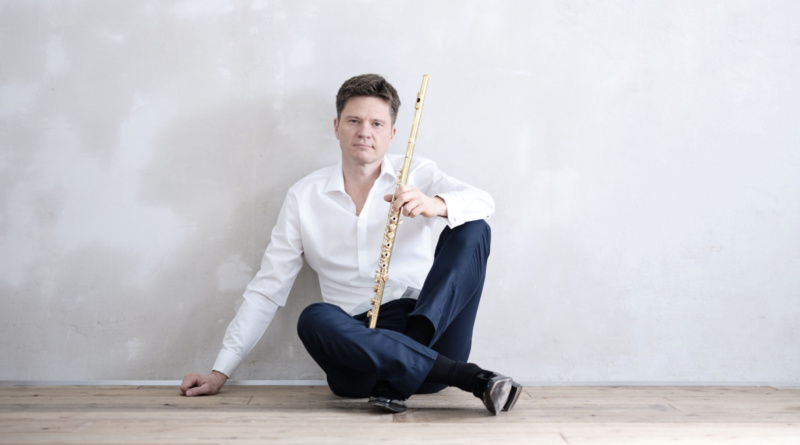Karl Heinz Schütz Artist Interview
Karl-Heinz Schütz is Solo Flute of Wiener Philharmoniker and therefore in the same position at the Wiener Staatsoper, having held the same position with the Stuttgarter Philharmoniker for four years, and with the Wiener Symphoniker from 2005 to 2011. Born in Innsbruck and raised in Landeck, Tyrol, he received his musical education at the Landeskonservatorium in Vorarlberg with Eva Amsler, Conservatoire national supérieur de musique in Lyon with Philippe Bernold, and with Aurèle Nicolet in Switzerland.
He won first prizes at the Carl Nielsen International Music Competition in 1998 und the International Flute Competition Kraków in 1999. He has performed as soloist across Europe and Japan, with performances of the importantflute concertos with Wiener Philharmonikerand Symphoniker as well as NHK Tokyo and Sapporo symphony orchestra, a.o. Conductors such as Daniel Barenboim, Fabio Luisi, Yakov Kreizberg, Dmitrij Kitajenko and Bertrand de Billy invited him to be the soloist in their concerts.
Karl-Heinz Schütz is Professor of Flute at the Musik und Kunst Privatuniversität Wien and has held several guest professorships. He gives master-classes throughout Europe and is also an active recording artist, especially for CAMERATA TOKYO, where his Mozart, Prokoffiev and Brahms Cds were released. With the Academy of St. Martin in the fields under Sir Neville Marriner an album was published at CHANDOS, with the title: 20th centuries concerto grosso. He is artistic director at HORIZONTE Landeck.
Are there specific aspects of flute playing or musicianship that you believe young flutists should focus on to enhance their chances of success?
My response would be: strive for beautiful playing, discover your unique sonority and voice, and evolve over time to play beautifully even in challenging registers and circumstances. However, I find this question challenging because I would counter with: What defines success?
I am aware that in terms of professional success, one can achieve to a certain extent. Yet, as human beings, there is much more to explore, experience, and accomplish in life. Learning how to navigate setbacks is just one example. Success can manifest in various forms simultaneously—external rewards like prizes or winning auditions, or deeply personal achievements, perhaps known only to your closest confidant.
To succeed professionally, develop top-notch skills through consistent training, trust in a mentor or teacher, possess a measure of talent, exercise patience, and a sprinkle of luck. Moreover, in playing musical instruments, residing in this 'non-digital' but 'purely analog world,' the key is self-discovery. Understand yourself as you would a good friend; genuine connections grow gradually. Familiarize yourself with your skills, enormous potential, and possibilities. It's analog, and the essence of live music, unlike streaming, cannot be fully experienced outside the magic of a live concert. Our ears and senses detect the difference. Some musical experiences unfold their true beauty only in the live concert setting.
Are there any fundamental principles or axioms of music that you cherish and consistently apply in your playing?
My fundamental principle is to bring music and joy to people while remaining open to inspiration from my fellow performers. For those who have encountered the enthralling 'flow-feeling' in music-making, it can't be forced but can be facilitated:
Preparation is key—know the score, understand the piece's background to become the translator of the music or the 'feeling' hidden between the lines.
CD Releases?
I have around 10 releases on the CAMERATA TOKYO label, featuring Mozart quartet concerti, Schubert variations, and Prokofiev. Additionally, Brahms Sonatas are available on NAXOS, and a POULENC and Syrinx on APARTE in 2023. Notably, a Lowell LIEBERMAN concerto, performed with the LANDECK wind band, is available on iTunes.
What does your schedule look like for the next 6 months?
Apart from the Philharmonic season, which includes a US tour (Carnegie Hall) and European tours with Welser Möst, Mehta, Thielemann, I'll be performing at the Vienna Opera, home of the Vienna Philharmonic. This includes engaging with inspiring voices.
I have soloist projects in France (CONNESSON FLUTE CONCERTO) and Taiwan (playing and conducting the national symphony). Additionally, I'll be creating a SOLO PIECE by Austrian composer CLEMENS GADENSTÄTTER (4 soliloquies on making of intimacy).
A tour to Japan for chamber-group concerts with the RING-Ensemble, focused on music around Blue Danube Waltz and the Strauss family, is on the agenda.
In June, I'll present a new project with my cherished chamber group, the ENSEMBLE WIEN BERLIN, at the Konzerthaus Vienna.
I'm honored to be a judge at a conducting competition in Copenhagen, Denmark.
Moreover, I'll coach the six students in my studio at the MUK (Musik und Kunst Privatuniversität VIENNA) and conduct masterclasses in Croatia and Norway.

What a lovely article. Thank you for sharing Maestro Schutz with us. I have a small question which is, will the Beethoven concerto ever be published? I have listened to it many many times on YouTube and would love to try playing it. You’re playing is so musical and gorgeous. Best wishes for a great 2024 Heidi in Atlanta